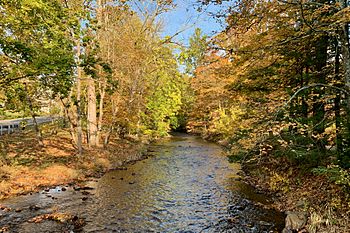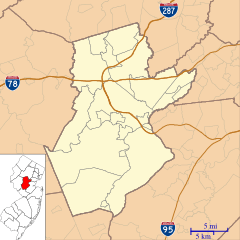Lamington River facts for kids
Quick facts for kids Lamington River |
|
|---|---|

Lamington River in Pottersville
|
|
| Country | United States |
| State | New Jersey |
| County | Morris County, Hunterdon County, Somerset County |
| Physical characteristics | |
| River mouth | North Branch Raritan River Bedminster 40°38′03″N 74°40′58″W / 40.63417°N 74.68278°W |
| Basin features | |
| River system | Raritan River |
| GNIS feature ID | 877658 |
The Lamington River is a cool waterway located in central New Jersey, United States. It's also known as the Black River when you go further upstream, especially near the town of Pottersville.
This river is a tributary of the North Branch Raritan River. Think of a tributary as a smaller stream or river that flows into a larger one. So, the Lamington River helps feed the North Branch Raritan River!
About the Lamington River
The Lamington River is an important part of the natural landscape in central New Jersey. It flows through several counties, including Morris County, Hunterdon County, and Somerset County.
The river eventually joins the North Branch Raritan River in Bedminster. This connection makes it part of the larger Raritan River system, which is one of New Jersey's most important rivers.
What is a Tributary?
A tributary is like a smaller branch of a tree that connects to a larger branch. In the world of rivers, a tributary is a stream or river that flows into a larger main river or a lake.
The Lamington River is a tributary because its waters flow into the North Branch Raritan River. This process helps to increase the amount of water in the larger river. Many rivers around the world are formed by several tributaries joining together.
Other Streams Joining It
Several smaller streams flow into the Lamington River, adding to its water. These are also considered tributaries of the Lamington River itself. They include:
- Bamboo Brook
- Cold Brook
- Rockaway Creek
- Tanners Brook
These smaller streams collect water from their surrounding areas and carry it into the Lamington River. This network of streams and rivers forms a watershed, where all the water eventually flows to a common outlet.
 | Leon Lynch |
 | Milton P. Webster |
 | Ferdinand Smith |


